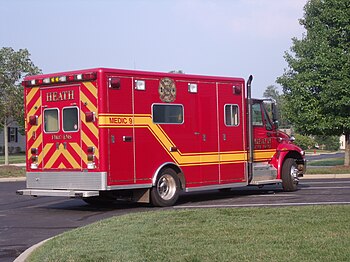After nearly three months, the recruits of Class 21 began their emergency medical technician training last week, embarking on a new, much more rigorously academic portion of the six-month academy.
 |
| English: Medic 9 (Photo credit: Wikipedia) |
“Up until this point, they’ve been in fire classes and fire classes have a lot of hands-on, outside scenarios like the burn building or rescue tech, cutting up cars, that kind of stuff,” said Bernie Studds, a fire medic III called in to teach the nine-week EMT course. “But about 90 percent of the calls we run out in the field are EMS-related, so this would be the best foundation, the greatest foundation that they could have as far as their job as a fire rescuer in Frederick County is concerned.”
While the recruits still have plenty of practical skills to master, the majority of EMT training will take place in the first-floor classrooms of the Public Safety Training Facility rather than in the facility’s burn building or fire tower, said Lt. Mike Webb, Class 21’s lead instructor.
Slated to run through late April, the EMT course will cover a wide variety of skills outlined in a massive textbook with lesson plans covering subjects as varied as on-scene patient assessments, soft-tissue injuries, allergic reactions, shock and spinal trauma, CPR and diabetic shock.
“It’s 1,581 pages,” said Fire Medic III Adam Miller, flipping through the textbook with a grin as recruits practiced CPR on a set of training mannequins nearby. “By the end of this course, they will have read every [page].”
In addition to being much more classroom-oriented, the EMT portion of training is much more challenging in terms of tests and exams the recruits need to pass to continue, Webb said.
“This is what I would consider the most academically challenging class,” Webb said. “Not that the others aren’t challenging, it’s just not as granular. ... [The recruits] have to know things like why the chemistry in the body is doing what it’s doing during very specific emergencies. They also have to know what it’s doing and how to fix it.”
Under the training academy’s rules, recruits may fail and retake a test just once, said Capt. Lenne Stolberg, the commander of the fire service’s training division, who has directly overseen the academy since the beginning of Recruit Class 19.
In the event of a failure, recruits get a remediation period that’s a minimum of three days. It often includes a specific lesson plan developed in conjunction with their instructors before they must take the test again. If they fail a second time, they are dismissed, Stolberg said.
“A good rule of thumb is we lose about 10 percent of a class to various issues,” Stolberg said. “For example, Recruit Class 19 started with a class of 30, of which we lost two during training.”
So far, recruit classes 20 and 21, both of which started with 24 recruits, have each lost one, Stolberg said. Class 21 lost its first recruit on the 42nd day of training — on or about Feb. 6 — the captain said.
Stolberg could not discuss details regarding any specific recruit’s dismissal from the academy, but common reasons include academic failures, injuries — new or aggravated — behavioral issues and recruits simply deciding not to continue for personal reasons.
Speaking generally, Stolberg agreed with Webb that the emergency medical portion of the academy is notoriously tough on recruits.
“There was a time when EMT was the first class we did right out of the gate because it tends to have the highest attrition rate,” Stolberg said. “But I think the way we have it right now is better because it gives us a little more time to identify those recruits who may just have some issues with testing performance. We can build those skills and build that confidence if we can identify those issues ahead of time.”
Webb and his fellow instructors were also doing their part to ensure that the recruits receive plenty of help in the coming weeks.
Many of the recruits with previous experience as volunteer firefighters have already passed the National Registry of Emergency Medical Technicians’ test, which their less experienced classmates will have to take in April. The class was broken up accordingly, Webb said.
Each recruit who will need to take the registry exam in April was seated next to a classmate who had already passed the exam and a fellow recruit who will also have to take the exam, Webb said. The idea is that each recruit who will have to take the test will learn alongside a more experienced mentor as well as a de facto “study buddy” during the next few weeks, Webb said.
The recruits were also taking the challenge seriously, Webb said, scrolling through a list of anonymous encouragements the recruits have written on sticky notes and left hanging near the front of the class.
“Recruit [Phillip] Tracey has been coming in early and staying late to study,” Webb said, reading one of the notes. “It is evidenced by his involvement in class discussion and his willingness to answer questions.”
Webb pointed to another note farther down the list, past several encouragements are written by recruits commending Studds in his first teaching appointment with the academy.
“This one says, ‘Recruit [Ryan] Bowe helped me study in [the] morning, week of [2/19],’” Webb said, smiling as he noticed the third note near the top of the list. “And this one, which kind of proves that point, it calls out the entire class: ‘RC 21, for finally starting to come together,’ and they underlined ‘finally.’”
Follow Jeremy Arias on Twitter: @Jarias_Prime.
















1 comments:
casino with video poker app for Android and iOS - Dr.MD
Play 광주광역 출장마사지 casino 동해 출장마사지 games in your browser, anytime. ✓ 양주 출장안마 Try the most popular casino games available on 통영 출장마사지 mobile 김제 출장안마 device ✓ Live Dealer, video poker,
Post a Comment